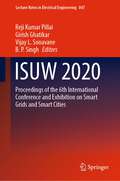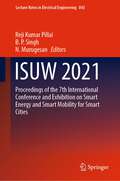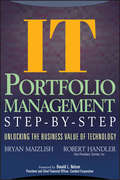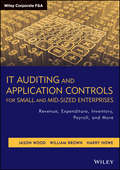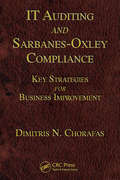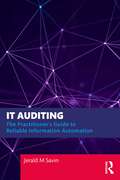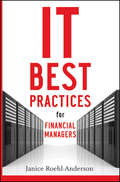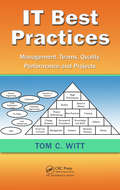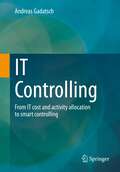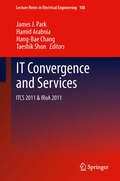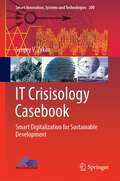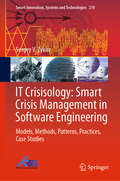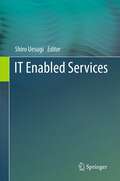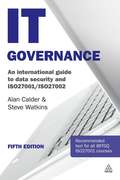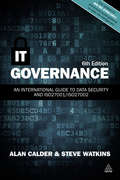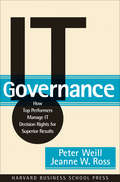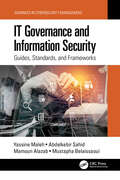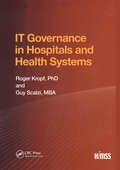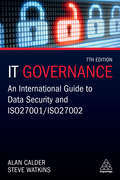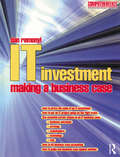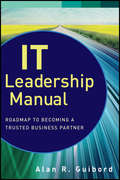- Table View
- List View
ISUW 2020: Proceedings of the 6th International Conference and Exhibition on Smart Grids and Smart Cities (Lecture Notes in Electrical Engineering #847)
by Reji Kumar Pillai Girish Ghatikar Vijay L. Sonavane B. P. SinghThis book presents selected articles from INDIA SMART UTILTY WEEK (ISUW 2020), which is the sixth edition of the Conference cum Exhibition on Smart Grids and Smart Cities, organized by India Smart Grid Forum from March 03-07, 2020, in New Delhi, India. ISGF is a public private partnership initiative of the Ministry of Power, Govt. of India, with the mandate of accelerating smart grid deployments across the country. This book gives current scenario updates of Indian power sector business. It also highlights various disruptive technologies for power sector business.
ISUW 2021: Proceedings of the 7th International Conference and Exhibition on Smart Energy and Smart Mobility for Smart Cities (Lecture Notes in Electrical Engineering #843)
by Reji Kumar Pillai B. P. Singh N. MurugesanThis book presents selected articles from INDIA SMART UTILTY WEEK (ISUW 2021), which is the seventh edition of the Conference cum Exhibition on Smart Grids and Smart Cities, organized by India Smart Grid Forum from 02-05 March 2021, in New Delhi, India. ISGF is a public private partnership initiative of the Ministry of Power, Govt. of India with the mandate of accelerating smart grid deployments across the country. This book gives current scenario updates of Indian power sector business. It also highlights various disruptive technologies for power sector business.
IT (Information Technology) Portfolio Management Step-by-Step: Unlocking the Business Value of Technology
by Robert Handler Bryan MaizlishPraise for IT Portfolio Management Step-by-Step"Bryan Maizlish and Robert Handler bring their deep experience in IT 'value realization' to one of the most absent of all IT management practices--portfolio management. They capture the essence of universally proven investment practices and apply them to the most difficult of challenges--returning high strategic and dollar payoffs from an enterprise's IT department. The reader will find many new and rewarding insights to making their IT investments finally return market leading results."--John C. Reece, Chairman and CEO, John C. Reece & Associates, LLC Former deputy commissioner for modernization and CIO of the IRS"IT Portfolio Management describes in great detail the critical aspects, know-how, practical examples, key insights, and best practices to improve operational efficiency, corporate agility, and business competitiveness. It eloquently illustrates the methods of building and integrating a portfolio of IT investments to ensure the realization of maximum value and benefit, and to fully leverage the value of all IT assets. Whether you are getting started or building on your initial success in IT portfolio management, this book will provide you information on how to build and implement an effective IT portfolio management strategy."--David Mitchell, President and CEO, webMethods, Inc."I found IT Portfolio Management very easy to read, and it highlights many of the seminal aspects and best practices from financial portfolio management. It is an important book for executive, business, and IT managers."--Michael J. Montgomery, President, Montgomery & Co."IT Portfolio Management details a comprehensive framework and process showing how to align business and IT for superior value. Maizlish and Handler have the depth of experience, knowledge, and insight needed to tackle the challenges and opportunities companies face in optimizing their IT investment portfolios. This is an exceptionally important book for executive leadership and IT business managers, especially those wanting to build a process-managed enterprise."--Peter Fingar, Executive Partner Greystone Group, coauthor of The Real-Time Enterprise and Business Process Management (BPM): The Third Wave"A must-read for the non-IT manager who needs to understand the complexity and challenges of managing an IT portfolio. The portfolio management techniques, analysis tools, and planning can be applied to any project or function."--Richard "Max" Maksimoski, Senior Director R&D, The Scotts Company"This book provides an excellent framework and real-world based approach for implementing IT portfolio management. It is a must-read for every CIO staff considering how to strategically and operationally impact their company's bottom line."--Donavan R. Hardenbrook, New Product Development Professional, Intel Corporation
IT Audit, Control, and Security
by Robert MoellerWhen it comes to computer security, the role of auditors today has never been more crucial. Auditors must ensure that all computers, in particular those dealing with e-business, are secure. The only source for information on the combined areas of computer audit, control, and security, the IT Audit, Control, and Security describes the types of internal controls, security, and integrity procedures that management must build into its automated systems. This very timely book provides auditors with the guidance they need to ensure that their systems are secure from both internal and external threats.
IT Auditing and Application Controls for Small and Mid-Sized Enterprises
by William Brown Jason Wood Harry HoweEssential guidance for the financial auditor in need of a working knowledge of IT If you're a financial auditor needing working knowledge of IT and application controls, Automated Auditing Financial Applications for Small and Mid-Sized Businesses provides you with the guidance you need. Conceptual overviews of key IT auditing issues are included, as well as concrete hands-on tips and techniques. Inside, you'll find background and guidance with appropriate reference to material published by ISACA, AICPA, organized to show the increasing complexity of systems, starting with general principles and progressing through greater levels of functionality. Provides straightforward IT guidance to financial auditors seeking to develop quality and efficacy of software controls Offers small- and middle-market business auditors relevant IT coverage Covers relevant applications, including MS Excel, Quickbooks, and report writers Written for financial auditors practicing in the small to midsized business space The largest market segment in the United States in quantity and scope is the small and middle market business, which continues to be the source of economic growth and expansion. Uniquely focused on the IT needs of auditors serving the small to medium sized business, Automated Auditing Financial Applications for Small and Mid-Sized Businesses delivers the kind of IT coverage you need for your organization.
IT Auditing and Sarbanes-Oxley Compliance: Key Strategies for Business Improvement
by Dimitris N. ChorafasInformation technology auditing and Sarbanes-Oxley compliance have several overlapping characteristics. They both require ethical accounting practices, focused auditing activities, a functioning system of internal control, and a close watch by the board's audit committee and CEO. Written as a contribution to the accounting and auditing professions
IT Auditing: The Practitioner's Guide to Reliable Information Automation
by Jerald SavinMore than ever, technology is indispensable to business operations and recordkeeping, so people skilled in computer automation — IT auditors — have become an essential part of the financial audit team.This book is a comprehensive guide to the IT audit discipline, and to the impact of abstraction on businesses. Developments including Robotic Process Automation (RPA) and artificial intelligence (AI) mean that businesses are moving from a physical world to an abstracted digital world, increasing reliance on systems, their design, their implementation and on those that oversee and maintain these systems — often parties outside the businesses’ control. Though the implications of these shifts go far beyond IT auditing, this book focuses on what IT auditors need to know in this new environment, such as:• How to understand abstracted services and appropriate internal business controls• How to evaluate situations where physicality has been replaced by abstracted services• How to understand and adapt to the impact of abstracted services on objectives, operations, decision-making, and Risk Management, including changing risk profiles and introducing new risks.In the wake of the Certified Public Accountant (CPA) Evolution project, this book will be an essential resource for readers seeking CPA certification, as well as for business leaders and Risk Management professionals who need to understand the benefits and challenges of ever-increasing automation and its concurrent abstraction of physical reality.
IT Best Practices for Financial Managers
by Roehl-Anderson Janice M.Praise for IT Best Practices "The work of the financial manager revolves around a company's financial systems. Ms. Roehl-Anderson's latest offering addresses the two key aspects of these systems-how to buy and install them. The book covers every conceivable aspect of these systems, including ERP, software as a service, shared services, and supporting controls. As a bonus, the book contains substantial coverage of information technology considerations in an acquisition. This is a definitive desk reference. " -Steve Bragg, CFO, XeDAR Corporation, and author of Accounting Best Practices "Sage advice from one of the most adept project managers in the industry! Jan and team have delivered a practical, yet comprehensive guidebook for software selection, implementation, rollout, and ongoing updates. This guidebook will become a valuable reference for every financial manager and IT project manager undertaking ERP implementation. "-Valerie Borthwick, former senior vice president, Oracle Consulting "Written by one of the best in the IT business, this book is a must-read for all CFOs and controllers. In one volume, it addresses everything a financial executive needs to know about IT and its impact on the financial function, while also featuring practical guidelines, current hot topics, and IT best practices. This book covers it all. "-Jo Marie Dancik, Regional Managing Partner (Retired), Ernst & Young
IT Best Practices: Management, Teams, Quality, Performance, and Projects
by Tom C. WittConsistent success does not happen by chance. It occurs by having an understanding of what is happening in the environment and then having the skills to execute the necessary changes. Ideal for project, IT, and systems development managers, IT Best Practices: Management, Teams, Quality, Performance, and Projects details the skills, knowledge, and a
IT Controlling: From IT cost and activity allocation to smart controlling
by Andreas GadatschIT controlling is established as a tool for controlling information technology. The job description of the IT controller has changed only moderately over a long period of time. It was mainly associated with IT budgeting, IT portfolio management, IT cost planning, accounting and controlling. However, digitalization has brought movement in goals, contents and methods. New topics such as digital strategy management, cloud controlling, data science, etc. are being discussed. The task profile is changing away from pure IT cost analysis to the management of the digitization strategy with a focus on strategic IT portfolio management. Some voices are already talking about "smart controlling" or "digital controlling". This book presents an IT controlling concept for the digital age and explains the relevant methods in a practical way.
IT Convergence and Services
by James J. Park Hamid Arabnia Hang-Bae Chang Taeshik ShonIT Convergence and Services is proceedings of the 3rd FTRA International Conference on Information Technology Convergence and Services (ITCS-11) and the FTRA International Conference on Intelligent Robotics, Automations, telecommunication facilities, and applications (IRoA-11). The topics of ITCS and IRoA cover the current hot topics satisfying the world-wide ever-changing needs. The ITCS-11 will be the most comprehensive conference focused on the various aspects of advances in information technology convergence, applications, and services. The ITCS-11 will provide an opportunity for academic and industry professionals to discuss the latest issues and progress in the area of ITCS. In addition, the conference will publish high quality papers which are closely related to the various theories, modeling, and practical applications in ITCS. The main scope of ITCS-11 is as follows. Computational Science and Applications Electrical and Electronics Engineering and Technology Manufacturing Technology and Services Management Information Systems and Services Electronic Commerce, Business and Management Vehicular Systems and Communications Bio-inspired Computing and Applications IT Medical Engineering Modeling and Services for Intelligent Building, Town, and City The IRoA is a major forum for scientists, engineers, and practitioners throughout the world to present the latest research, results, ideas, developments and applications in all areas of intelligent robotics and automations. The main scope of IRoA-11 is as follows. Intelligent Robotics & Perception systems Automations & Control Telecommunication Facilities Artificial Intelligence The IRoA is a major forum for scientists, engineers, and practitioners throughout the world to present the latest research, results, ideas, developments and applications in all areas of intelligent robotics and automations. The main scope of IRoA-11 is as follows. Intelligent Robotics & Perception systems Automations & Control Telecommunication Facilities Artificial Intelligence
IT Crisisology Casebook: Smart Digitalization for Sustainable Development (Smart Innovation, Systems and Technologies #300)
by Sergey V. ZykovThe book focuses on the real-world case-based crisis management in digital product development. This includes forecasting, responding, and agile engineering/management methods, patterns, and practices for sustainable development. This book introduces a set of case studies for sustainability in management as a blend, the components of which have been carefully selected from a few domains adjacent to digital production such as IT-intensive operation, human resource management, and knowledge engineering, to name a few. The key ingredients of this crisis management framework include information management, tradeoff optimization, agile product development, and knowledge transfer. The case studies this book features will help the stakeholders in understanding and identifying the key technology, business, and human factors that may likely result in a digital production crisis, i.e., critically affect the organization outcomes in terms of successful digitalization and sustainable development. These factors are particularly important for the large-scale applications, typically considered very complex in managerial and technological aspects, and, therefore, specifically addressed by the discipline of IT crisisology.
IT Crisisology: Models, Methods, Patterns, Practices, Case Studies (Smart Innovation, Systems and Technologies #210)
by Sergey V. ZykovThis book focuses on crisis management in software development which includes forecasting, responding and adaptive engineering models, methods, patterns and practices. It helps the stakeholders in understanding and identifying the key technology, business and human factors that may result in a software production crisis. These factors are particularly important for the enterprise-scale applications, typically considered very complex in managerial and technological aspects and therefore, specifically addressed by the discipline of software engineering. Therefore, this book throws light on the crisis responsive, resilient methodologies and practices; therewith, it also focuses on their evolutionary changes and the resulting benefits.
IT Enabled Services
by Shiro UesugiAs the global economy turns more and more service oriented, Information Technology-Enabled Services (ITeS) require greater understanding. Increasing numbers and varieties of services are provided through IT. Furthermore, IT enables the creation of new services in diverse fields previously untouched. Because of the catalyzing nature of internet technology, ITeS today has become more than "Outsourcing" of services. This book illustrates the enabling nature of ITeS with its entailment of IT, thus contributing to the betterment of humanity. The scope of this book is not only for academia but also for business persons, government practitioners and readers from daily lives. Authors from a variety of nations and regions with various backgrounds provide insightful theories, research, findings and practices in various fields such as commerce, finance, medical services, government and education. This book opens up a new horizon with the application of Internet-based practices in business, government and in daily lives. Information Technology-Enabled Services works as a navigator for those who sail to the new horizon of service oriented economies.
IT Framework Design Parameters
by Charles Freedman Douglas LaxtonA report from the International Monetary Fund.
IT Governance
by Alan Calder Steve WatkinsThe development of IT governance - which recognises the convergence between business practicve and IT management - makes it essential for managers at all levels, and in organizations of all sizes, to understand how best to deal with information security risk. The new edition has been full updated to take account of the latest regulatory and technological developments, including the creation of the International Board for IT Governance Qualifications. IT Governance also includes new material on key international markets - including the UK and the US, Australia and South Africa.
IT Governance
by Alan Calder Steve WatkinsFaced with constant and fast-evolving threats to information security and with a growing exposure to cyber risk, managers at all levels and in organizations of all sizes need a robust IT governance system. Now in its sixth edition, the bestselling IT Governance provides best-practice guidance for companies looking to protect and enhance their information security management systems and protect themselves against cyber threats. IT Governance has been fully updated to take account of current cyber security and advanced persistent threats and reflects the latest regulatory and technical developments, including the 2013 updates to ISO27001/ISO27002. Changes for this edition include: Full updates throughout in line with the revised ISO27001 standard and accompanying ISO27002 code of practice for information security controls Full coverage of changes to data-related regulations in different jurisdictions and advice on compliance Guidance on the options for continual improvement models and control frameworks made possible by the new standard New developments in cyber risk and mitigation practices The latest technological developments that affect IT governance and security Guidance on the new information security risk assessment process and treatment requirements Including coverage of key international markets including the UK, North America, the EU and Asia Pacific, IT Governance is the definitive guide to implementing an effective information security management and governance system.
IT Governance
by Jeanne W. Ross Peter WeillFirms with superior IT governance have more than 25% higher profits than firms with poor governance given the same strategic objectives. These top performers have custom designed IT governance for their strategies. Just as corporate governance aims to ensure quality decisions about all corporate assets, IT governance links IT decisions with company objectives and monitors performance and accountability. Based on a study of 250 enterprises worldwide, IT Governance shows how to design and implement a system of decision rights that will transform IT from an expense to a profitable investment.
IT Governance Archetypes for Allocating Decision Rights
by Jeanne W. Ross Peter WeillThis chapter discusses how IT governance differs across five decision domains and addresses who should make IT decisions. This chapter was originally published as chapter 3 of "IT Governance: How Top Performers Manage IT Decision Rights for Superior Results."
IT Governance Simultaneously Empowers and Controls
by Jeanne W. Ross Peter WeillEffective IT governance is the single most important predictor of the value an organization generates from IT. This chapter provides an overview of IT governance and a framework for linking it to corporate governance that will enable organizations to deliver superior results on their IT investments. This chapter was originally published as chapter 1 of "IT Governance: How Top Performers Manage IT Decision Rights for Superior Results."
IT Governance and Information Security: Guides, Standards, and Frameworks (Advances in Cybersecurity Management)
by Yassine Maleh Mamoun Alazab Abdelkebir Sahid Mustapha BelaissaouiIT governance seems to be one of the best strategies to optimize IT assets in an economic context dominated by information, innovation, and the race for performance. The multiplication of internal and external data and increased digital management, collaboration, and sharing platforms exposes organizations to ever-growing risks. Understanding the threats, assessing the risks, adapting the organization, selecting and implementing the appropriate controls, and implementing a management system are the activities required to establish proactive security governance that will provide management and customers the assurance of an effective mechanism to manage risks. IT Governance and Information Security: Guides, Standards, and Frameworks is a fundamental resource to discover IT governance and information security. This book focuses on the guides, standards, and maturity frameworks for adopting an efficient IT governance and information security strategy in the organization. It describes numerous case studies from an international perspective and brings together industry standards and research from scientific databases. In this way, this book clearly illustrates the issues, problems, and trends related to the topic while promoting the international perspectives of readers. This book offers comprehensive coverage of the essential topics, including: IT governance guides and practices; IT service management as a key pillar for IT governance; Cloud computing as a key pillar for Agile IT governance; Information security governance and maturity frameworks. In this new book, the authors share their experience to help you navigate today’s dangerous information security terrain and take proactive steps to measure your company’s IT governance and information security maturity and prepare your organization to survive, thrive, and keep your data safe. It aspires to provide a relevant reference for executive managers, CISOs, cybersecurity professionals, engineers, and researchers interested in exploring and implementing efficient IT governance and information security strategies.
IT Governance in Hospitals and Health Systems (HIMSS Book Series)
by Roger KropfWithout a governance structure, IT at many hospitals and healthcare systems is a haphazard endeavor that typically results in late, over-budget projects and, ultimately, disparate systems. IT Governance in Hospitals and Health Systems offers a practical "how to" in creating an information technology governance process that ensures the IT projects supporting a hospital or health systems' strategy are completed on-time and on-budget. The authors define and describe IT governance as it is currently practiced in leading healthcare organizations, providing step-by-step guidance of the process to readers can replicate these best practices at their own hospital or health system. The book provides an overview of what IT governance is and why it is important to healthcare organizations. In addition, the book examines keys to IT governance success, as well as common mistakes to avoid; governance processes, workflows and project management; and the important roles that staff, a board of directors and committees play. Special features in the book include case studies from hospitals and health systems that have successfully developed an effective IT governance structure for their organization.
IT Governance: An International Guide to Data Security and ISO 27001/ISO 27002 (It Governance Ser.)
by Alan Calder Steve WatkinsFaced with the compliance requirements of increasingly punitive information and privacy-related regulation, as well as the proliferation of complex threats to information security, there is an urgent need for organizations to adopt IT governance best practice. IT Governance is a key international resource for managers in organizations of all sizes and across industries, and deals with the strategic and operational aspects of information security. Now in its seventh edition, the bestselling IT Governance provides guidance for companies looking to protect and enhance their information security management systems (ISMS) and protect themselves against cyber threats. The new edition covers changes in global regulation, particularly GDPR, and updates to standards in the ISO/IEC 27000 family, BS 7799-3:2017 (information security risk management) and the latest standards on auditing. It also includes advice on the development and implementation of an ISMS that will meet the ISO 27001 specification and how sector-specific standards can and should be factored in. With information on risk assessments, compliance, equipment and operations security, controls against malware and asset management, IT Governance is the definitive guide to implementing an effective information security management and governance system.
IT Investment: Making a Business Case (Computer Weekly Professional Ser.)
by Dan Remenyi Michael Sherwood-SmithFrequently not enough attention is given to producing a comprehensive business case or to producing an economic justification for an information systems investment. In fact many organizations are not clear as to what constitutes a sound business case and how to go about producing one. This Professional level book for the Computer Weekly Professional Series will show how to go about justification for I.T. spend. This book is designed for all those who are involved in the decision to invest in information systems. This book is especially relevant to senior business executives, senior financial managers and IT executives. Business consultants, computer and corporate advisors will also find the ideas and material addressed in this text of particular benefit as will anyone involved in corporate and strategic planning.In addition, senior students such as those working towards their MBAs will find this book of use.A business case is a statement or a series of statements that demonstrate the economic value of a particular intervention, a course of action or a specific investment. A business case is not simply a financial forecast of the hardware and software costs and the expected benefits. A business case for an information systems investment involves a comprehensive understanding of both the likely resources as well as the business drivers which will assist business managers improve their performance and thereby obtain a stream of benefits from the investment.In general there are approximately six steps in producing a business case for an information systems investment.1. Determine the high-level business outcomes that will be clearly and comprehensively expressed as a set of opportunities the organization can take advantage of, or problems that need to be rectified.2. Identify the corporate critical success factors that will be supported or enhanced by the operation of the completed information systems project or investment.3. Create a list of specific and detailed outcomes or benefits, their appropriate metrics, measuring methods and responsibility points that are represented by the stakeholders.4. Quantify the contribution made by the outcomes, which requires associating numbers or benefit values with outcomes where this is possible.5. Highlight the risks associated with the project.Fundamental to this new approach to developing a business case for information systems investment is the fact that it incorporates much more than the financial numbers which are typically found in the standard approach to a feasibility study. This approach looks behind the financial numbers to the improvements in business performance which are facilitated by information systems and which are the real drivers of the benefits. Furthermore, this approach to developing a business case allows the organization to manage the process so that the required results are achieved.
IT Leadership Manual: Roadmap to Becoming a Trusted Business Partner (Wiley CIO #577)
by Alan R. GuibordSavvy advice for developing the necessary skills to become a vital part of any management team Today's IT leaders are faced with an unprecedented leadership and organizational challenge. The entire landscape has changed over the past few years and it is now time for leaders and organizations to re-invent themselves to meet the new order. IT leaders need to redefine their role into one of being a trusted business advisor. IT Leadership Manual provides you with a set of specific recommendations and suggestions to assist you in your self-evaluations and to develop a personal plan for the future. It helps you build the leader in you, as well as how to become a formidable competitor in your own right. Essential coverage of one of the most demanded IT topics Helps you redefine your role from IT leader into trusted business advisor Discusses leadership style, building out your network, achieving balance, the art of sales, and more Written for IT managers and executives Helps you transform from the backroom support service to a recognized member of the leadership team Gives you the tools to migrate to today's expectations; Innovation, collaboration, influencer, trusted advisor Traditional skills no longer apply. Organizations are now demanding a new set of expectations from IT leaders. IT Leadership Manual reveals how you can adopt new styles to make the transformation from IT manager to top management.
